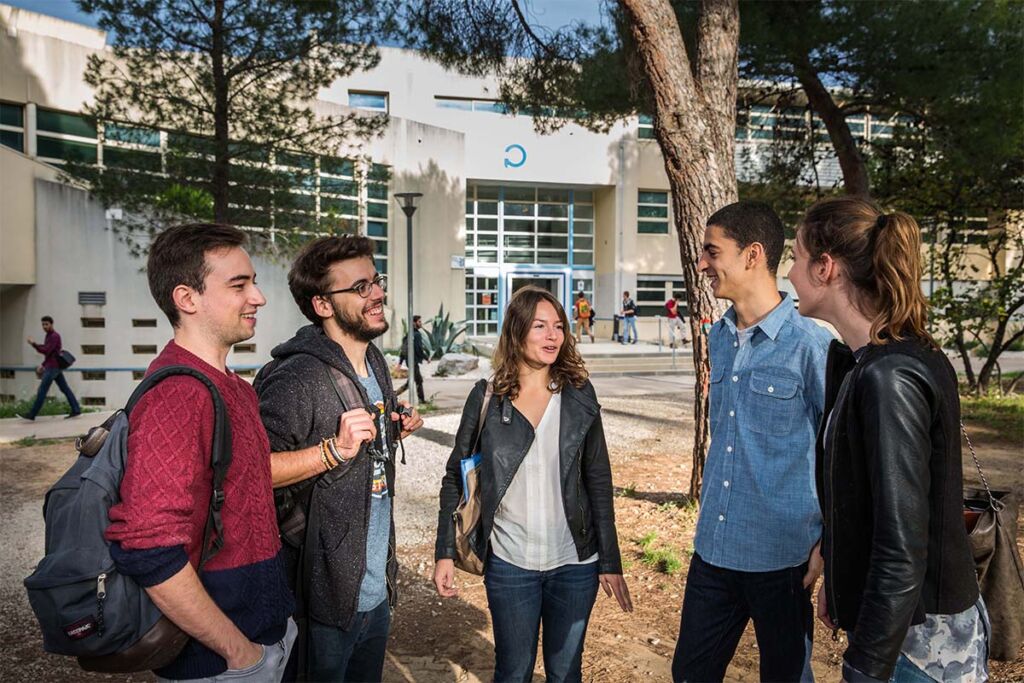Polytech Montpellier, voted responsible campus of the year
Five years after obtaining the national "Sustainable Development and Social Responsibility" (DD&RS) label, Polytech Montpellier has confirmed its pioneering position in this area by winning this year's "Responsible Institution of the Year" award at the French-speaking responsible campus awards. This distinction crowns ten years of commitment and mobilization within the engineering school.

The Responsible Campus Awards recognize higher education institutions that have implemented the most inspiring and innovative sustainable development projects. This year, 27 projects were submitted by 19 French and international campuses committed to addressing social and environmental issues in their activities and teaching.
Polytech Montpellier won in the competition's premier category: Responsible Institution of the Year. To apply, each candidate had to present a project that had been in place for more than five years. " At Polytech, we made this commitment back in 2010, " explains physicist Jean-Louis Bantignies, DDRS project manager at the school. " So this year, we decided that we were ready to apply and that we had a few arguments to make. "
This is quite an understatement, given that the Polytech team, led by its director Lionel Torres, has developed a virtually exemplary action program on campus over the years. " This momentum did not happen overnight; it grew as we realized the importance of trainingengineers in DDRS issues. Today, it is a strategic focus of our policy." In 2016, Polytech Montpellier was already one of the top ten French higher education institutions to obtain the national DD&RS label. This recognition was renewed in 2020.
A cross-functional approach
It was in 2012, to be precise, that the school decided to structure its SD&SR action based on the framework law enacted during the Grenelle Environment Forum (2009), identifying the main areas of sustainable development and social responsibility. Through its Professors researchers, and staff, Polytech Montpellier takes a cross-disciplinary approach to training, governance, environmental management, social policy and regional roots, research, and innovation. The primary objective is to ensure that every student, regardless of their specialization, is aware of these issues.
To this end, "each student takes a test—the Polytest—which allows them to assess their knowledge of the UN's Sustainable Development Goals (SDGs). Designed in-house, this test will soon be rolled out across the entire French Polytech network , which comprises fifteen engineering schools and four associated schools," explains Lionel Torres. " For us, this is the first building block of training and awareness-raising, which will then be followed by a cross-disciplinary module on understanding the challenges of ecological transition. It will be implemented for the 2021/2022 academic year and will form a common learning foundation for all our students," adds Jean-Louis Bantignies.
By students, for students
And that is precisely what lies at the heart of Polytech's DDRS initiative: a dynamic created by students for students. This is evidenced by the organization of lecture series on DDRS issues. Last year, for example, energy and climate change engineer Jean-Marc Jancovici gave a highly successful talk. " It's the students who choose the guests, contact them, and host the evening... We are there to provide support, but they are the real actors," insists the director. We can also mention the national Ecotrophelia prize for food innovation, won last year by Polytech thanks to a student initiative, and the Poly'Earth club, which has been actively involved in the institution's SDD policy since 2017.
Next year, the school will go even further by offering students a tool to measure the carbon impact generated by their international travel. Presented in the form of a platform also designed by Polytech students, this tool, called Mobilan, " aims to encourage them to make better choices about their modes of transportation (plane, train, bus, or others) by taking into account not only price and speed, but also, and above all, their carbon footprint, " continues Lionel Torres.
A policy of continuous improvement
Measurement tools that contribute to Polytech's policy of continuous improvement. According to Jean-Louis Bantignies, this is essential: " There are often methodological issues surrounding DDRS issues. When setting medium-term objectives, milestones are needed to achieve them. We don't measure things enough; we need to periodically review where we are and adapt our resources based on the results. It is by measuring SDDS indicators that we can initiate a solid continuous improvement process." In 2014, the school recruited a quality engineer whose job is to measure this progress. The working group set up specifically to oversee the DDRS mission now consists of six people and is supplemented on the training side by a committee bringing together representatives from each engineering program.
Every two years, the engineering school produces a summary report on its activities. " Over the last two years, we have listed 115 awareness-raising and communication initiatives in the form of conferences, evening events, articles, newsletters, press releases, etc., " explains Lionel Torres. The school's carbon footprint is calculated on a multi-year basis by a teacher who has developed specific expertise in this area, assisted by one or two groups of three students tasked with measuring any progress made. " It's not always easy, we don't always move as fast as we would like, but it's this self-assessment work that allows us to stay on track and explore blind spots," concludes Jean-Louis Bantignies.